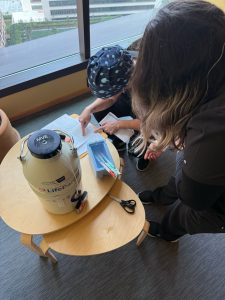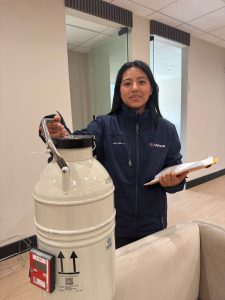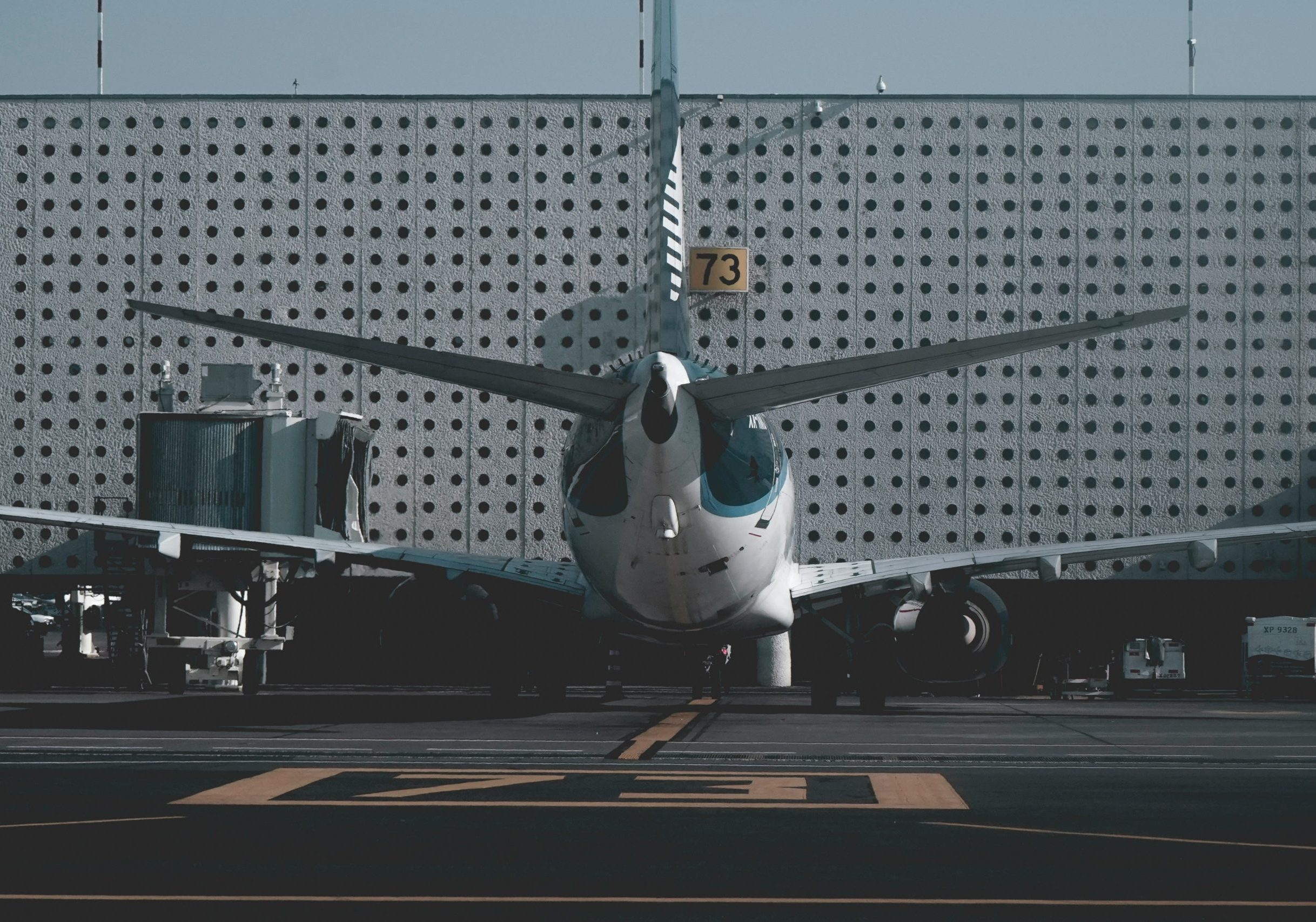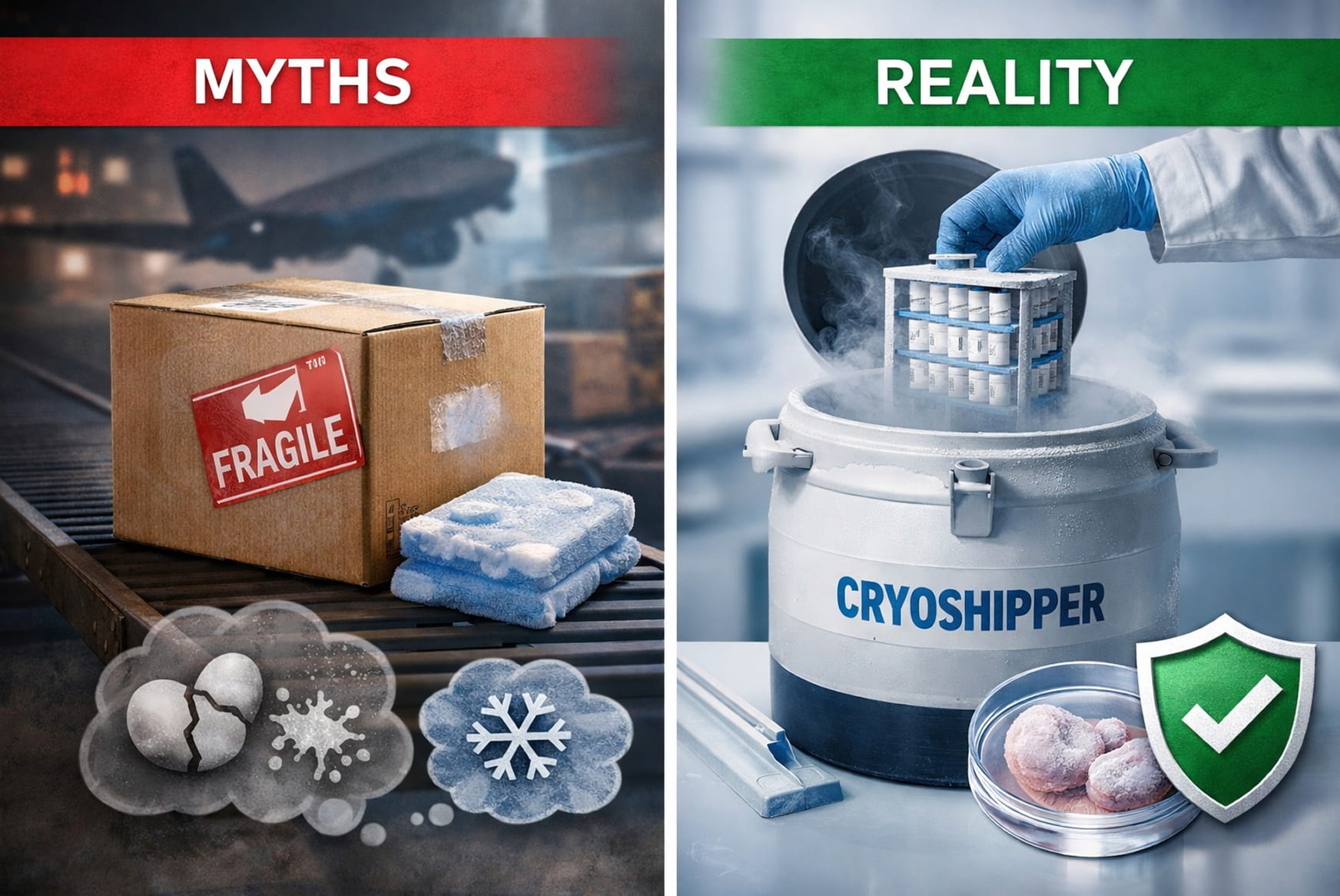If you’re researching international fertility transport, you’ve probably come across stories about embryos or eggs getting stuck at customs. Maybe you’ve heard about specimens being “seized” or held for days while families wait anxiously. These stories are scary, but they’re also confusing—what actually happens at customs? And more importantly, how can you make sure it doesn’t happen to your specimens?
Understanding IVF shipping customs doesn’t have to be overwhelming. Here’s what really goes on with fertility materials at international borders, what causes problems, and how to protect your specimens from unnecessary delays.
Why customs officers hold up IVF materials
Fertility materials aren’t typical cargo, and customs officers may not encounter them regularly. When they do, several factors can trigger holds or additional scrutiny:
Incomplete or incorrect documentation: Every country requires specific paperwork for importing biological materials. Missing health certificates, incorrect patient information, or outdated permit numbers can stop your shipment cold.
Unclear labeling: Vague descriptions like “medical specimens” or “biological samples” raise red flags. Customs officers need to know exactly what they’re dealing with—eggs, sperm, embryos, or other fertility materials.
Unusual container appearance: Cryogenic tanks look suspicious to officers unfamiliar with fertility transport. The liquid nitrogen, specialized equipment, and medical labeling can seem concerning without proper explanation.
Translation and communication barriers: Technical medical terminology may be misunderstood or incorrectly translated, causing confusion about what’s being imported and why.
Regulatory compliance gaps: Different countries have varying requirements for fertility material imports. Missing permits, inadequate advance approvals, or failure to meet specific country requirements are common causes of delays.
Security concerns: Post-9/11 security protocols mean anything unusual gets extra attention. Fertility materials, with their specialized containers and handling requirements, often fall into this category.
FDA requirements for US imports: US imports face particularly complex regulations, and documentation errors can result in specimens being delayed for weeks at customs offices.
What actually happens when specimens are “seized”
The word “seized” sounds terrifying, but customs authorities typically use the term “hold” for temporary suspensions of goods at the border to ensure compliance with import laws. Here’s the documented process:
Initial hold: Customs officers flag the shipment for additional review. Your specimens remain in their cryogenic container, but they cannot leave the port of discharge until the issue is resolved.
Documentation review: Officers examine all paperwork, looking for missing permits, incorrect information, or regulatory compliance issues. This is one of the most common reasons for holds.
Agency consultation: If officers are unfamiliar with fertility materials, they may consult with medical authorities, import specialists, or partner government agencies like the FDA. This consultation process takes additional time.
Resolution process: Once issues are identified, you (or your transport company) must provide additional documentation, corrections, or clarifications to customs authorities.
Final determination: There are typically three possible outcomes: release once corrections are made, additional requirements that must be met, or in rare cases involving serious regulatory violations, seizure of materials.
Timeline: Customs clearance typically takes 24-72 hours under normal circumstances, but holds can extend this significantly. Simple documentation issues might resolve within days, while complex problems involving missing permits or regulatory violations can take weeks or even months to resolve.
The key point: most IVF shipping customs holds are bureaucratic delays rather than permanent seizures, but they require proper documentation and expertise to resolve efficiently.
Why international IVF shipping can be challenging
Different countries have varying regulations for importing biological materials, and these IVF shipping customs requirements change frequently. What’s clear from regulatory guidance is that international fertility transport involves significant complexity:
Documentation requirements vary widely: Each country has different forms, certificates, and advance approvals required for importing biological materials. What’s accepted in one country may be insufficient in another.
Advance planning is essential: International shipments typically require weeks of preparation time to gather proper documentation and secure necessary permits.
Language and translation challenges: Technical medical terminology may need proper translation, and communication with foreign customs authorities can present barriers.
Regulatory changes: Import requirements for biological materials can change, making it important to work with services that stay current on international regulations.
Partner agency involvement: Many countries involve additional agencies beyond customs (health departments, agriculture departments, etc.) in reviewing biological material imports.
How professional couriers prevent IVF shipping customs problems
Experienced fertility transport companies, like LifeParcel, navigate these challenges through systematic preparation:
Advance research: Professional services know current regulations for each destination country and stay updated on changes.
Documentation preparation: They prepare all required paperwork in advance, ensuring accuracy and completeness before shipments begin.
Customs pre-clearance: Many work with customs brokers or directly with customs authorities to pre-approve shipments and minimize delays.
Proper labeling: Specimens are labeled clearly and specifically, with detailed descriptions that customs officers can understand.
Officer education: Experienced couriers can explain fertility materials to customs officers who may be unfamiliar with these shipments.
Contingency planning: Professional services have backup plans for delays, including extended cryogenic storage and alternative routing options.
Direct communication: They maintain direct contact with customs authorities and can respond quickly to requests for additional information.
Red flags: when your transport company isn’t customs-ready
Watch for these warning signs that suggest your transport provider may not be prepared for IVF shipping customs challenges:
Vague answers about documentation: If they can’t explain exactly what permits are required for your destination, they’re not prepared.
No mention of advance clearance: Professional services discuss customs pre-approval processes. If yours doesn’t, that’s concerning.
Generic shipping approach: Companies that treat fertility materials like any other medical specimens may not understand the specialized requirements.
Unclear about delays: If they can’t explain their process for handling customs holds, they probably don’t have one.
No backup plans: Professional services always have contingency plans for extended delays.
Limited international experience: Ask how many shipments they’ve completed to your specific destination and what challenges they’ve encountered.
What you can do to prevent IVF shipping customs issues
While you can’t control customs processes directly, you can influence the outcome by choosing experienced providers. Work with companies that specialize in fertility material transport and have customs expertise, such as LifeParcel.
How LifeParcel protects your specimens at customs:
Destination expertise: We maintain current knowledge of customs requirements for all 32+ countries we serve, including recent regulatory changes that could affect your shipment.
Advance coordination: We work with customs authorities before your specimens travel, securing advance approvals and addressing potential issues early in the process.
Complete documentation preparation: Our team prepares all required permits, health certificates, and customs forms with precision, reducing the risk of holds due to paperwork errors.

Trained courier communication: Our couriers are specifically trained in effective communication with customs officials. They understand how to explain fertility materials professionally, answer questions clearly, and prevent misunderstandings that could lead to delays or escalation.
Professional relationship management: When issues arise, our couriers know how to work collaboratively with officials rather than creating confrontation, helping ensure clearance happens as swiftly as possible.
Contingency planning: If delays occur despite preparation, our 24/7 support team works immediately to resolve problems while keeping your specimens safely preserved.
Complete transparency: We keep you informed throughout the process and explain any challenges clearly, so you’re never left wondering what’s happening to your specimens.
This level of customs expertise removes the burden from you and ensures your genetic material gets the professional handling it deserves at international borders.
The bottom line on IVF shipping customs problems
IVF shippping customs issues are usually preventable with proper preparation, accurate documentation, and professional expertise. The horror stories you hear often involve shipments that weren’t prepared correctly or companies that didn’t understand the complexity of international regulations.
Your embryos, eggs, or sperm represent months of treatment, significant financial investment, and your hopes for building a family. They deserve more than a generic shipping approach that treats them like any other medical specimens.
At LifeParcel, we handle the customs complexity so you don’t have to. Our experience with international regulations and trained couriers ensure your specimens arrive without bureaucratic delays.

Want to take the stress out of IVF transport? Request a quote or call us at +1-866-370-6577.





